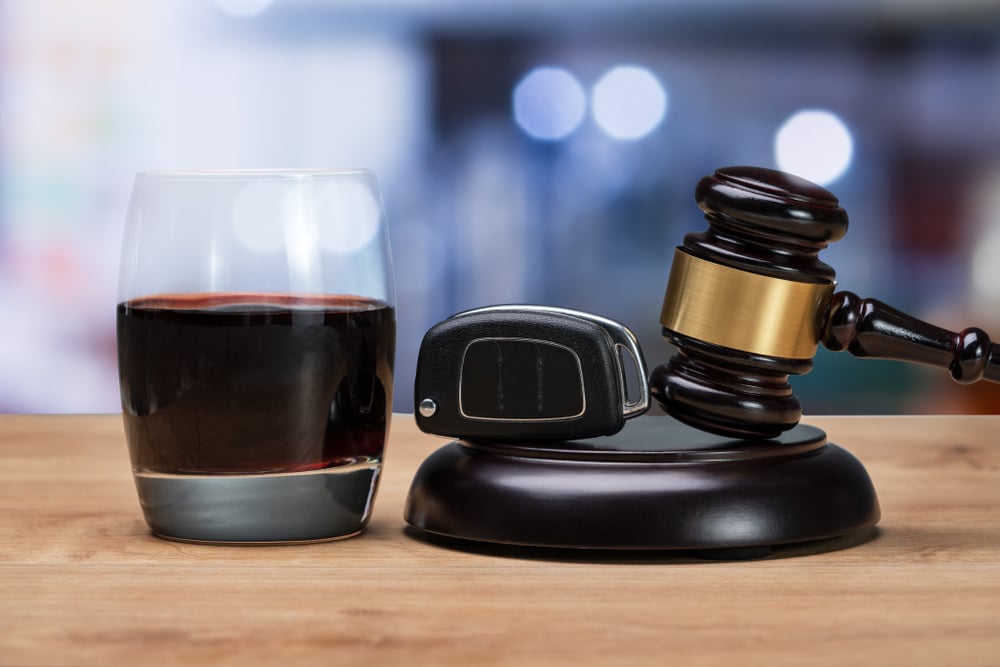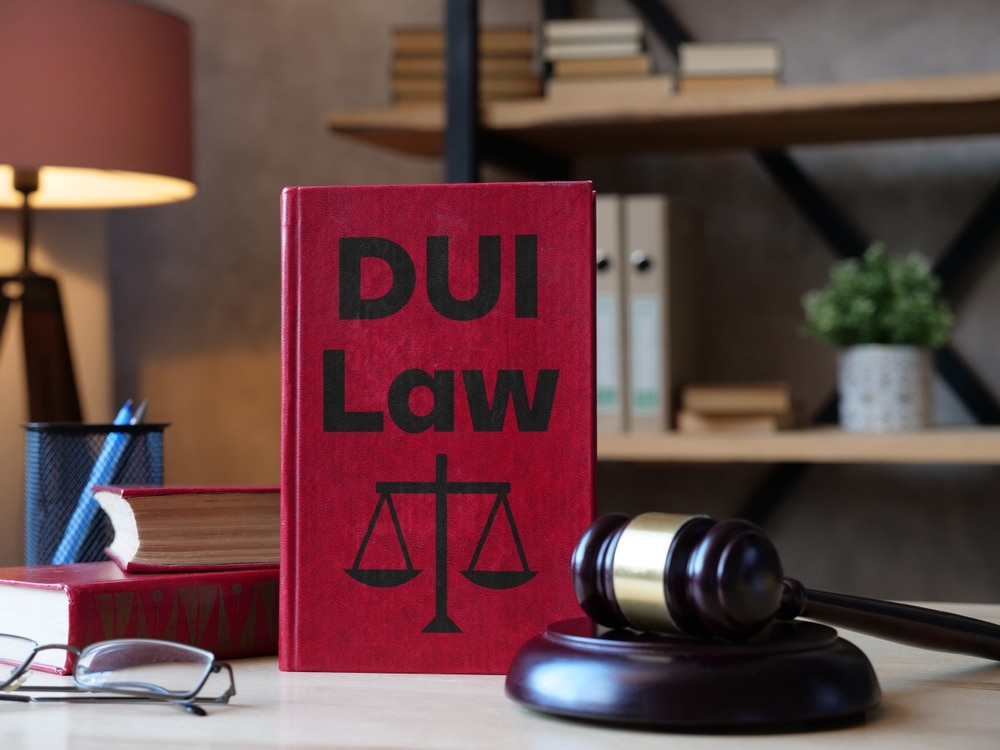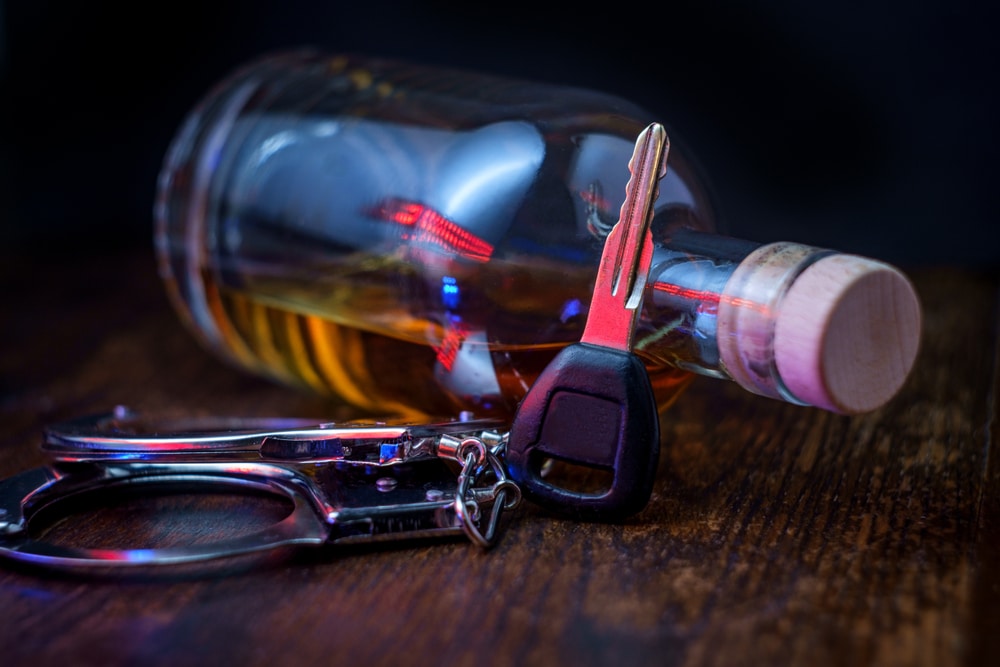
New Jersey’s DUI laws (referred to as DWI – Driving While Intoxicated) are among the strictest in the nation, operating under N.J.S.A. 39:4-50. The state enforces a per se blood alcohol concentration (BAC) limit of 0.08% for standard drivers and 0.04% for commercial drivers, with a zero-tolerance policy for drivers under 21. Law enforcement officers can make arrests based on observed impairment, even if BAC is below these limits.
The state maintains a vigorous enforcement strategy through both state and local police agencies, conducting regular sobriety checkpoints and saturation patrols. New Jersey operates under implied consent laws, meaning drivers automatically consent to chemical testing by operating a vehicle on state roads. Refusal to submit to testing carries separate and additional penalties beyond DWI charges.

0.08% or higher for regular drivers and 0.04% for commercial drivers

Yes

3 months

Mandatory

Yes (0.10%+)
New Jersey’s DWI landscape is characterized by its dense population centers, extensive highway system, and proximity to major metropolitan areas. The state faces unique challenges due to high traffic volumes and numerous entertainment districts, particularly along the shore regions and in urban areas. Statistical data shows concentrated DWI incidents along major corridors such as the Garden State Parkway and New Jersey Turnpike.
Recent trends indicate a gradual decline in alcohol-related crashes, though drug-impaired driving cases have increased significantly. The state’s approach combines aggressive enforcement with public education and prevention programs. Law enforcement agencies focus particularly on high-risk periods such as holidays and summer months when shore traffic increases substantially.
First-time DWI offenders with a BAC of 0.08% to 0.10% face fines of $250-$400, up to 30 days imprisonment, license suspension until installation of an ignition interlock device (IID), and mandatory IID for 3 months after restoration. For BACs over 0.10%, penalties increase to fines of $300-$500, up to 30 days imprisonment, and longer IID requirements. First-time offenders must also attend the Intoxicated Driver Resource Center (IDRC) program.
Subsequent offenses carry progressively harsher penalties. Second offenders face fines of $500-$1,000, 48 hours to 90 days imprisonment, license suspension until IID installation, and mandatory IID for 2-4 years. Third and subsequent offenses result in fines of $1,000, 180 days imprisonment, license suspension until IID installation, and mandatory IID for 4 years after restoration.
DWI offenses involving accidents resulting in injury or death are subject to enhanced penalties under New Jersey’s vehicular homicide and assault by auto statutes. These cases are typically prosecuted as indictable offenses (felonies) rather than traffic violations, carrying potential prison sentences of 5-10 years for vehicular homicide and up to 18 months for assault by auto.
Additional aggravating circumstances include DWI with a minor in the vehicle (triggering separate child endangerment charges), DWI in school zones (doubling standard penalties), and DWI while suspended for a previous DWI (mandatory jail time). Commercial drivers face enhanced penalties and longer license suspensions, potentially affecting their ability to maintain employment.
New Jersey law enforcement employs a multi-faceted approach to DWI detection and apprehension. Officers receive specialized training in detecting impaired driving behaviors and conducting standardized field sobriety tests (SFSTs). The state utilizes both marked and unmarked patrol vehicles, with dedicated DWI enforcement units in many jurisdictions.
Sobriety checkpoints are conducted regularly, following strict constitutional guidelines established by state courts. These operations must be properly noticed and conducted according to specific protocols. The state also employs “wolfpack” patrols, where multiple officers concentrate enforcement efforts in high-risk areas.
New Jersey law enforcement utilizes state-of-the-art technology for DWI detection and evidence collection. The primary breath testing instrument approved for evidentiary use is the Alcotest 7110 MKIII-C, which must be calibrated regularly and operated by certified personnel. The state maintains strict protocols for breath test administration, including a required 20-minute observation period before testing.
Advanced roadside screening devices provide preliminary breath testing capabilities, though these results are not admissible in court and serve only to establish probable cause. The state has also implemented drug recognition expert (DRE) programs, training officers in advanced techniques for detecting drug impairment using standardized evaluation procedures.
All enforcement vehicles are equipped with mobile video recording systems (MVR) that automatically activate during traffic stops. These systems capture both video and audio evidence of the entire interaction, including field sobriety tests. Body-worn cameras provide additional documentation, ensuring comprehensive evidence collection and accountability.
New Jersey’s treatment approach centers on the Intoxicated Driver Resource Center (IDRC) program, which provides education and screening for all DWI offenders. First offenders must attend a 12-hour program over two days, while multiple offenders are required to attend a 48-hour program. These programs include assessment for substance use disorders and referral to additional treatment when necessary.
The state maintains a network of approved treatment providers who offer various levels of care, from outpatient counseling to intensive residential programs. Treatment plans are individualized based on comprehensive evaluations that consider factors such as substance use history, mental health status, and risk assessment results.
Treatment programs incorporate evidence-based practices and must meet state certification requirements. Special consideration is given to providing culturally competent services for New Jersey’s diverse population, including programs offered in multiple languages and those addressing specific cultural contexts.
The state’s mandatory treatment framework operates on a progressive intervention model. All offenders must complete the basic IDRC program, but additional treatment requirements are determined by individual assessment results and offense history. The framework includes specific protocols for screening, assessment, referral, and monitoring of treatment compliance.
Treatment providers must maintain state certification and adhere to standardized protocols for program delivery. Regular reporting to the courts and probation officers ensures accountability throughout the treatment process. The framework includes specific requirements for program content, duration, and documentation of progress.
New Jersey’s treatment framework emphasizes both rehabilitation and prevention, incorporating relapse prevention strategies and ongoing support mechanisms. Programs must demonstrate effectiveness through outcome measures and maintain specific success rates to retain their certification. The state regularly evaluates program effectiveness and updates requirements based on emerging best practices.


New Jersey implements a rigorous monitoring system for DWI offenders through multiple agencies and technologies. The primary monitoring tool is the ignition interlock device program, which requires regular data downloads and compliance reporting. These devices are equipped with cameras to verify the identity of users and GPS capabilities to track installation compliance.
Probation departments conduct regular check-ins and random alcohol/drug testing for offenders under supervision. The state utilizes a progressive sanctions model for violations, with immediate consequences for non-compliance. Some high-risk offenders may be required to wear continuous alcohol monitoring devices or submit to more frequent testing.
A centralized database tracks all aspects of compliance, including treatment attendance, interlock readings, and test results. This system allows for real-time notification of violations and coordinates responses between enforcement agencies, courts, and treatment providers.
The New Jersey Motor Vehicle Commission (MVC) manages the administrative aspects of DWI cases parallel to criminal proceedings. Upon arrest, drivers face immediate license suspension through an administrative process that begins with the issuance of a temporary driving permit valid for seven days.
Administrative hearings must be requested within 10 days of the arrest and focus on specific statutory elements such as probable cause for the stop, proper administration of chemical tests, and officer qualifications. These hearings are conducted by administrative law judges and are separate from criminal court proceedings.
The MVC maintains detailed records of all DWI-related actions and coordinates with courts and law enforcement agencies through an integrated computer system. This system ensures accurate tracking of offender status, compliance with requirements, and timely processing of license restorations.
License restoration procedures require completion of all court-ordered requirements, payment of restoration fees, and submission of proof of insurance. Offenders must also provide documentation of completed treatment programs and installation of required ignition interlock devices.
The state maintains strict compliance verification procedures before restoring driving privileges. This includes confirmation of payment of all fines and fees, completion of suspension periods, and verification of insurance coverage. The MVC conducts thorough reviews of all documentation before processing restoration requests.
Administrative appeals processes are available for contested cases, though they must be filed within specified timeframes and meet specific criteria for consideration. The state provides clear guidelines for the appeals process, including required documentation and grounds for appeal.
New Jersey’s courts handle DWI cases through a specialized process designed to ensure both efficiency and due process. Initial appearances must occur within 14 days of the arrest, and cases must be resolved within 60 days according to state Supreme Court guidelines. DWI cases are heard in municipal courts, though serious cases involving injury or death are elevated to Superior Court.
The state prohibits plea bargaining in DWI cases, requiring either a guilty plea or trial. Cases proceed through standardized stages including arraignment, pre-trial conferences, motion hearings, and either trial or plea resolution. The courts maintain strict scheduling requirements to prevent unnecessary delays.
Discovery procedures in DWI cases include automatic provision of specific documents including police reports, chemical test results, calibration records, and video evidence. Defense attorneys have specific timeframes to file motions challenging evidence or procedures, with courts required to schedule prompt hearings on such motions.
The New Jersey Division of Highway Traffic Safety serves as the lead agency for DWI prevention and enforcement coordination. This agency manages federal grant funding, coordinates enforcement campaigns, and maintains statistical data on DWI incidents and outcomes across the state.
The New Jersey State Police, through its Fatal Accident Investigation Unit and Alcohol/Drug Testing Unit, provides crucial support for DWI enforcement. These units maintain testing equipment, train officers, and conduct investigations of serious DWI incidents. The State Police laboratory provides forensic testing services for blood and urine samples.
The Motor Vehicle Commission, Administrative Office of the Courts, and Department of Health and Human Services all play vital roles in managing various aspects of the state’s DWI control system. These agencies coordinate through an integrated computer system that allows real-time sharing of offender information and case status.
New Jersey participates in the Interstate Driver License Compact, sharing DWI conviction information with other states to prevent offenders from evading consequences by moving across state lines. The state gives full consideration to out-of-state DWI convictions when determining penalties for subsequent offenses.
Special protocols exist for handling cases involving out-of-state drivers, particularly given New Jersey’s position as a major transit corridor between New York and Philadelphia. Law enforcement agencies maintain agreements with neighboring states for pursuit and arrest protocols, and courts have established procedures for ensuring appearance compliance from out-of-state offenders.
Commercial drivers face additional interstate considerations due to federal regulations. New Jersey courts must report commercial driver DWI convictions to both the state’s MVC and the Federal Motor Carrier Safety Administration, ensuring that violations affect commercial driving privileges nationwide.
New Jersey faces unique jurisdictional challenges due to its complex network of state, county, and local law enforcement agencies. Coordination between these entities requires sophisticated communication systems and clear protocols for case handling and evidence sharing.
The state’s numerous toll roads and interstate highways create special enforcement considerations. The New Jersey Turnpike Authority and Port Authority maintain their own police forces, requiring careful coordination with state and local agencies for DWI enforcement.
Cases involving federal properties or military installations require specific handling procedures. State authorities must coordinate with federal law enforcement and military police when incidents occur within their jurisdictions, following established protocols for case processing and information sharing.
DWI enforcement and prosecution costs New Jersey approximately $200 million annually in direct expenses, including law enforcement operations, court proceedings, and monitoring programs. These costs are partially offset by fines and fees collected from offenders, though the state still bears significant financial burden.
Individual offenders face substantial financial penalties beyond court-imposed fines. Total costs for a first offense, including fines, surcharges, insurance increases, and program fees, typically range from $5,000 to $15,000. Subsequent offenses can result in costs exceeding $20,000 when all penalties and requirements are considered.
The economic impact extends to businesses through lost productivity, increased insurance costs, and expenses related to employee screening and monitoring. The state estimates that workplace impacts of DWI offenses cost New Jersey businesses over $50 million annually in lost productivity and replacement worker expenses.


New Jersey’s DWI incidents create substantial societal burdens beyond direct financial costs. Healthcare systems bear significant strain from DWI-related injuries, with emergency departments and trauma centers reporting that alcohol-related crashes account for approximately 30% of their critical care cases. These medical costs often translate to higher insurance premiums and increased taxpayer burden through public healthcare programs.
Families of both offenders and victims experience devastating emotional and financial impacts. Loss of employment, legal fees, and long-term care needs can destabilize entire households. The state estimates that each fatal DWI crash costs society approximately $1.4 million when factoring in medical costs, property damage, lost productivity, and quality of life impacts.
Communities face broader impacts through reduced public safety, increased insurance rates, and strain on social service systems. Local governments often must allocate additional resources to enforcement and prevention programs, while businesses in areas with high DWI rates may experience reduced patronage and increased security costs.
New Jersey’s legislature regularly evaluates and updates DWI laws to address emerging challenges and incorporate new technologies. Current legislative trends focus on strengthening penalties for drug-impaired driving, particularly in light of changing marijuana laws. Proposed legislation includes expanding the use of oral fluid testing and updating standards for drug recognition expert testimony.
The state is considering mandatory ignition interlock devices for all offenders, regardless of BAC level or offense number. This proposed change reflects growing evidence that interlock devices are more effective than license suspension alone in preventing repeat offenses. Additional proposals include expanding treatment options and implementing more sophisticated monitoring systems.
Recent legislative discussions have also focused on addressing the backlog of DWI cases in municipal courts and improving the efficiency of case processing. Proposed reforms include standardizing evidence collection procedures and expanding the use of virtual court appearances for certain proceedings.
New Jersey is implementing advanced technologies throughout its DWI enforcement and monitoring systems. New generation ignition interlock devices include GPS tracking, real-time reporting capabilities, and enhanced anti-circumvention features. The state is also piloting automated license plate readers specifically programmed to identify vehicles registered to individuals with suspended licenses due to DWI.
Electronic citation systems are being deployed statewide, allowing officers to process DWI arrests more efficiently and ensure accurate data entry into state databases. These systems integrate with court management software, reducing processing time and minimizing data entry errors.
The state is investing in advanced roadside testing technologies, including portable devices capable of detecting both alcohol and drug impairment. Development of a centralized evidence management system is underway to improve the handling and tracking of DWI-related evidence, including digital video recordings and chemical test results.
Drug-impaired driving presents growing challenges for New Jersey law enforcement, particularly with the legalization of recreational marijuana. The state is adapting by increasing the number of drug recognition experts and investing in new detection technologies, while also developing standards for determining impairment levels for various substances.
The rise of ride-sharing services has impacted DWI patterns, particularly in urban areas. While these services have contributed to reducing traditional DWI incidents, new challenges have emerged, including determining liability when ride-share drivers are found impaired.
Alternative transportation technologies, including autonomous vehicles, are beginning to influence DWI policy discussions. The state is considering how these technologies might affect future enforcement strategies and legislative requirements, while also addressing potential new forms of impaired operation.
New Jersey maintains a comprehensive approach to DWI prevention through multiple educational initiatives. The state’s “Drive Sober or Get Pulled Over” campaign coordinates with national efforts and includes targeted advertising, increased enforcement periods, and community outreach programs. Educational programs begin in high schools through the Driver Education curriculum and extend to college campuses through peer education initiatives.
The Division of Highway Traffic Safety partners with various organizations to deliver prevention messages to high-risk populations. These programs include specialized outreach to young drivers, professional training for alcohol servers, and workplace safety programs. The state also coordinates with entertainment venues and sports facilities to promote designated driver programs and safe transportation alternatives.
Public-private partnerships support prevention efforts through initiatives such as free ride programs during holidays and major events. Local prevention coalitions receive state funding to implement community-specific programs addressing unique local challenges and demographic needs.
DWI convictions in New Jersey can significantly impact employment opportunities and job retention. Commercial drivers face mandatory disqualification of their Commercial Driver’s License (CDL) for one year on first offense and lifetime disqualification for second offenses. These penalties apply even if the violation occurred in a personal vehicle, effectively ending careers in the transportation industry.
Many employers have mandatory reporting requirements for DWI arrests, often resulting in immediate suspension or termination, particularly in positions requiring driving or professional licenses. Public sector employees, including teachers, law enforcement officers, and government workers, may face disciplinary actions or loss of employment due to DWI convictions.
Background check policies often flag DWI convictions, limiting future employment opportunities. Some industries maintain zero-tolerance policies that automatically disqualify candidates with DWI convictions, regardless of when the offense occurred. Professional license holders may face additional scrutiny and potential disciplinary actions from licensing boards.
New Jersey regularly evaluates the effectiveness of its DWI treatment programs through data collection and outcome analysis. Studies indicate that completion of the state’s Intoxicated Driver Resource Center (IDRC) program, combined with appropriate follow-up treatment, reduces recidivism rates by approximately 40% compared to non-treatment alternatives.
Success rates vary significantly based on factors such as completion of recommended treatment levels, participation in aftercare programs, and implementation of support systems. Programs incorporating both cognitive behavioral therapy and substance abuse education show particularly promising results, with recidivism rates below 20% for participants who complete all components.
The state uses effectiveness data to continuously refine treatment requirements and program standards. Recent analysis has led to increased emphasis on individualized treatment planning and the integration of mental health services when indicated. Programs showing consistent success receive priority for state funding and referrals.
DWI convictions in New Jersey result in significant insurance consequences through the state’s insurance surcharge system. Offenders must pay annual surcharges for three years, ranging from $1,000 to $1,500 per year, in addition to increased premium rates. Insurance companies typically classify DWI offenders as high-risk drivers for 5-10 years following conviction.
Many standard insurance carriers will cancel coverage following a DWI conviction, forcing offenders into the assigned risk pool with substantially higher premiums. The state requires offenders to maintain higher liability coverage limits than standard policies, further increasing insurance costs.
Offenders must provide proof of insurance through special certificates (FR-44) before license restoration, and any lapse in coverage results in immediate suspension of driving privileges. The total insurance impact over the first three years following a DWI conviction often exceeds $10,000 in additional costs.


While New Jersey doesn’t specifically require SR-22 filings, it mandates similar proof of insurance through FR-44 certificates for DWI offenders. These certificates must be maintained for a minimum of three years following license restoration and require insurance companies to notify the state immediately of any policy cancellation or lapse.
The FR-44 requirement involves higher minimum liability coverage limits than standard policies: $100,000 for injury/death to one person, $300,000 for injury/death to multiple persons, and $50,000 for property damage. Insurance companies charge additional fees for filing and maintaining these certificates.
Any lapse in FR-44 coverage triggers automatic license suspension and extends the required filing period. Offenders who move to other states must maintain New Jersey’s insurance requirements until the filing period expires, often requiring coordination between insurance providers in multiple states.
DWI convictions often create cascading effects on offenders’ quality of life beyond legal penalties. Transportation limitations severely impact daily activities, requiring significant lifestyle adjustments. Many offenders report difficulties maintaining employment, attending family obligations, and accessing medical care due to license suspensions and interlock requirements.
Financial strain from fines, fees, and increased insurance costs often leads to significant economic hardship. Some offenders report having to sell assets, take additional jobs, or relocate closer to work to manage these financial burdens. The impact on credit scores and financial stability can persist for years after conviction.
The stigma associated with DWI conviction can affect personal relationships and social connections. Many offenders report experiencing depression, anxiety, and isolation during and after the legal process. The state’s treatment programs increasingly address these psychological impacts as part of comprehensive rehabilitation efforts.
New Jersey’s approach to DWI enforcement and prevention represents one of the nation’s most comprehensive and stringent systems. The state’s multi-faceted strategy combines strict laws, vigorous enforcement, sophisticated detection technologies, and rehabilitation programs to address both the immediate and underlying causes of impaired driving. Through coordinated efforts between law enforcement agencies, courts, treatment providers, and community organizations, New Jersey has developed a system that serves as a model for other jurisdictions.
The economic and societal impacts of DWI in New Jersey extend far beyond individual offenders, affecting families, communities, and the state’s resources. Direct costs include enforcement expenses, medical care, and property damage, while indirect costs encompass lost productivity, increased insurance rates, and strain on social services. The state’s significant investment in prevention, enforcement, and treatment programs reflects recognition of these widespread impacts and the need for comprehensive solutions.
Technological advances continue to shape both enforcement methods and monitoring capabilities in New Jersey. The integration of sophisticated testing equipment, electronic monitoring devices, and data management systems has enhanced the state’s ability to detect, process, and track DWI offenses. Ongoing legislative updates reflect the need to adapt to emerging challenges while maintaining constitutional protections and ensuring fair treatment of offenders.
The effectiveness of New Jersey’s DWI programs relies heavily on the coordination between various stakeholders and the state’s commitment to evidence-based practices. Success in reducing DWI incidents depends on maintaining this collaborative approach while continuously evaluating and improving program components based on outcome data and emerging best practices. The state’s experience demonstrates that effective DWI control requires a balance of enforcement, education, and rehabilitation efforts.
The future of DWI prevention and enforcement in New Jersey continues to evolve with new challenges and opportunities. Emerging issues such as drug-impaired driving, changing transportation technologies, and evolving social attitudes toward impaired driving require ongoing adaptation of laws, procedures, and prevention strategies. The state’s commitment to addressing these challenges while maintaining strong enforcement and rehabilitation programs positions it to continue leading in DWI prevention efforts.
At DUI 101, our mission is to empower you with the knowledge needed to make informed decisions during this challenging time. Explore our articles and guides to better understand your situation and the steps ahead.
© 2024 Chapman SEO LLC. This website is for educational and informational purposes only. All content is created using AI technology and maintained by non-lawyers and should not be considered legal advice. The information provided is general in nature and may not be suitable for your specific situation. Always consult with a qualified legal professional for advice regarding your individual circumstances. We do not create attorney-client relationships through this website. By using this site, you acknowledge that you have read and understand these terms.